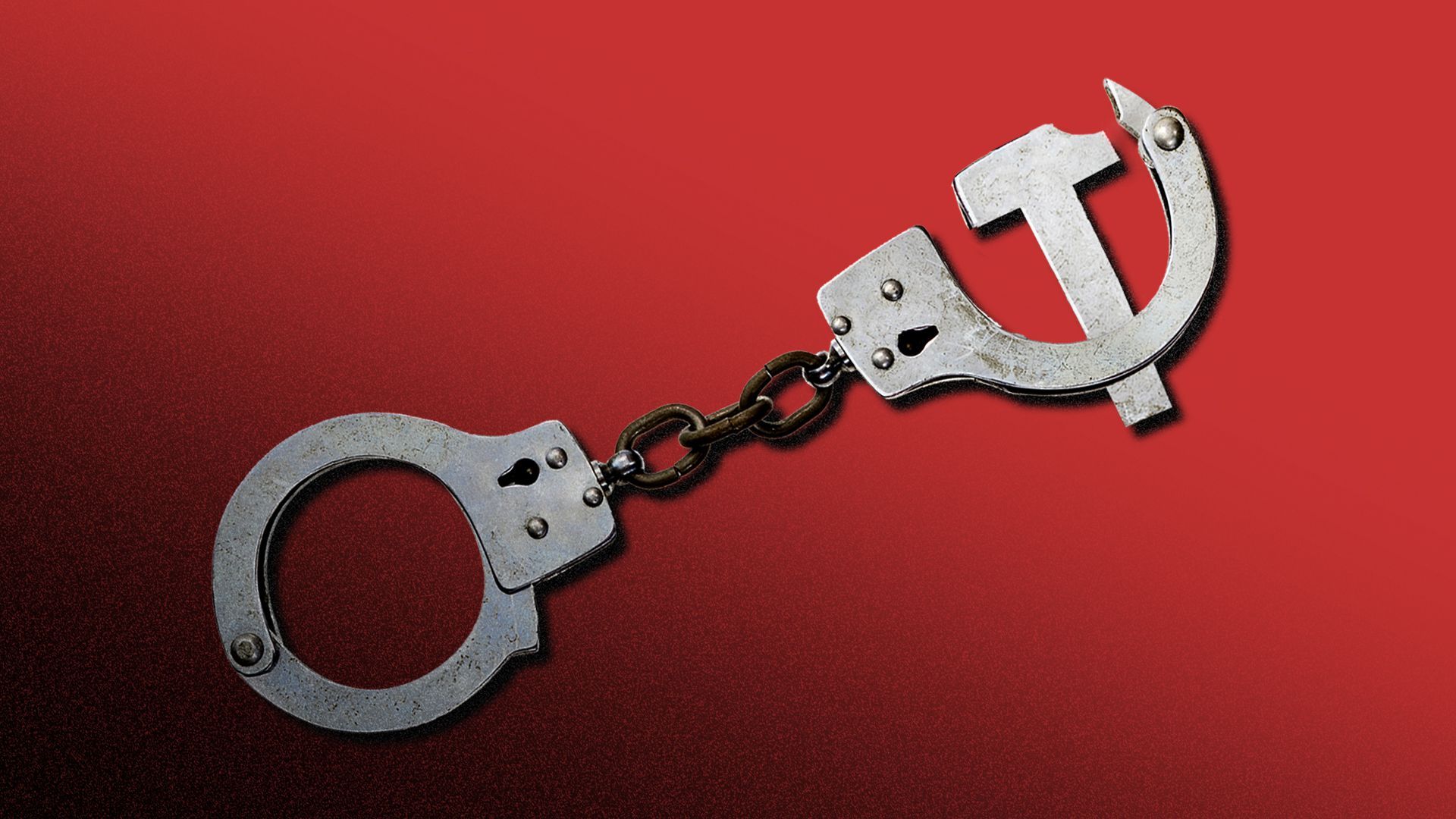The end of Hong Kong's political freedom is here
Add Axios as your preferred source to
see more of our stories on Google.

Illustration: Annelise Capossela/Axios
The end of Hong Kong's relatively free political system is no longer looming. It's here.
Why it matters: The Chinese Communist Party is already wielding the new national security law it forced upon Hong Kong just over a month ago — and through the extraterritoriality enshrined in the new law, Beijing has signaled that its push against pro-democracy activism is going global.
What's happening: Hong Kong police have arrested top media and political figures, searched the offices of a major news organization, and indicted overseas activists.
- Early in the morning on Aug. 10, about 200 police swarmed the offices of Hong Kong newspaper Apple Daily, and arrested its owner, the pro-democracy media tycoon Jimmy Lai, and several other media executives.
- Agnes Chow, former leader of the pro-democracy organization Demosisto, was also arrested on Aug. 10.
- On July 31, Hong Kong authorities issued arrest warrants for six activists based abroad, including a U.S. citizen, for “incitement to secession and collusion with foreign forces."
- Hong Kong Chief Executive Carrie Lam also announced on July 31 that she would postpone the upcoming elections for one year.
Last week, the U.S. sanctioned Lam and other top Hong Kong and Chinese officials deemed responsible for the destruction of the city's political rights.
The big picture: The Chinese Communist Party under President Xi Jinping has learned it doesn't need tanks and machine guns to stop a vibrant political movement.
- In Hong Kong, the party has used repressive police action and the hammer of law to crush dissent, a phenomenon known in Chinese tradition as "rule by law," rather than "rule of law."
- The new national security law circumvented Hong Kong's traditionally independent courts and established a secret police, quietly bringing in state security officials from mainland China to convert a hotel into a new Hong Kong headquarters.
- The vaguely worded law criminalizes sedition, terrorism, separatism, and collusion with foreign powers, defining them broadly and imposing harsh penalties.
- Critics have said the vague wording is intentional, since it pressures people to practice sweeping self-censorship to avoid crossing unknown lines.
What they're saying: Observers abroad have expressed anger and profound concern at China's latest moves in the city.
- “The arrests, and the raid on the newsroom, are a direct assault on Hong Kong’s press freedom and signal a dark new phase in the erosion of the city’s global reputation," the Foreign Correspondents Club of Hong Kong said in a statement.
- "Today's arrests have confirmed our gravest fears about how the #NationalSecurityLaw will be used to silence the press and deny fundamental freedoms in Hong Kong," the Inter-Parliamentary Alliance on China, an organization comprised of current lawmakers from around the world who aim to counter China's authoritarianism, tweeted Aug. 10.
- "Crazy arrests. The end of freedom of press in Hong Kong. The national security law is quashing the freedom of our society, spreading politics of fear," Nathan Law, a former Hong Kong lawmaker who fled to London after the national security law came into effect, wrote on Twitter Aug. 10.
But, but, but: Many Hong Kongers haven't given up.
- On July 12, more than 600,000 Hong Kong residents cast votes in a primary for the upcoming election, despite official warnings the campaigns might be illegal under the new law.
- Tuesday editions of Apple Daily, Lai's newspaper, flew off the stands in the early morning as city residents rushed to buy it after police raided the newspaper's offices.
What to watch: Article 38 in the national security law states the law applies to everyone, everywhere.
- The indictment in late July of U.S. citizen Samuel Chu, who resides in the U.S., for "collusion with foreign forces" — in other words, Chu's own government — heralds the opening of a dark chapter both for Hong Kong and the world.
Go deeper: With new security law, China outlaws global activism
